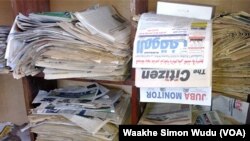Three weeks after the South Sudan government ordered The Citizen media group in Juba to close its doors, some 75 staff newspaper and television workers have been laid off, the editor-in-chief said Monday.
Nhial Bol said he and the media group’s management took the difficult decision to send workers home without pay because the forced closure of the company has cut off revenues and negatively affected the bottom line.
"We studied the situation, and we cannot afford to have 75 people who are doing nothing," Bol said. "We cannot maintain them. So we decided both the newspaper and television staff have to go home. All the staff have gone now.”
The government has never offered an explanation as to why it ordered The Citizen to close on Aug. 4.
Bol said his understanding is that the paper was shuttered after it ran a report calling for all parties involved in the peace talks for South Sudan to sign an agreement brokered by regional bloc IGAD to end 20 months of fighting.
Rebel leader Riek Machar signed the deal for the armed opposition and Pagan Amum signed for the group of former detainees on the August 17th deadline set by IGAD. But President Salva Kiir refused then to sign the deal, saying he needed another two weeks to consult with a broad base of South Sudanese about the terms of the agreement.
Mr. Kiir is expected to add his signature to the agreement on Wednesday after a mini-summit with the heads of neighboring states in Juba.
Vain efforts
But Mr. Kiir signing the deal will not alleviate the woes of The Citizen media group.
Bol said he has tried to engage with the government, to get permission to reopen the newspaper, but up to now, his efforts have been in vain.
"All the documents they have been asking, we gave them. They asked us to give them the Text Index Number -- they call it TIN. Then they asked us for our registration certificate, operation certificate, renewal certificate, for the registration and tax clearance certificate... we gave them all. We don’t know what they are still looking for,” Bol said.
Human impact
One of the laid-off staff members was a senior reporter on The Citizen newspaper. Ater Garang said being out of work will affect more people than just him.
“It will affect my community and especially my family, whom I support using the little resources that I get from The Citizen newspaper," he told South Sudan in Focus.
Gale Julius worked as a reporter on the paper -- until he was laid off.
"I have to start going to the streets, looking for another job," he said. "These days, getting a job in Juba is very difficult. So I am really appealing to the people who are behind the closure of the newspaper to come to our rescue.”
Two other media groups – the Netherlands-based Free Voice and Arabic language newspaper Al Rai – were also shut down by the National Security Service at the beginning of the month. It is unclear if they have had to lay off workers. Voice of America used to operate out of the Free Voice offices in Juba.
In the days following the spate of closures, representatives of the European Union in Juba released a statement calling on the South Sudanese authorities to respect the right to free speech and allow the media to operate unhindered.
“We urge the authorities of the Republic of South Sudan to guarantee the exercise of these freedoms in conformity with international standards,” the European diplomats said.






